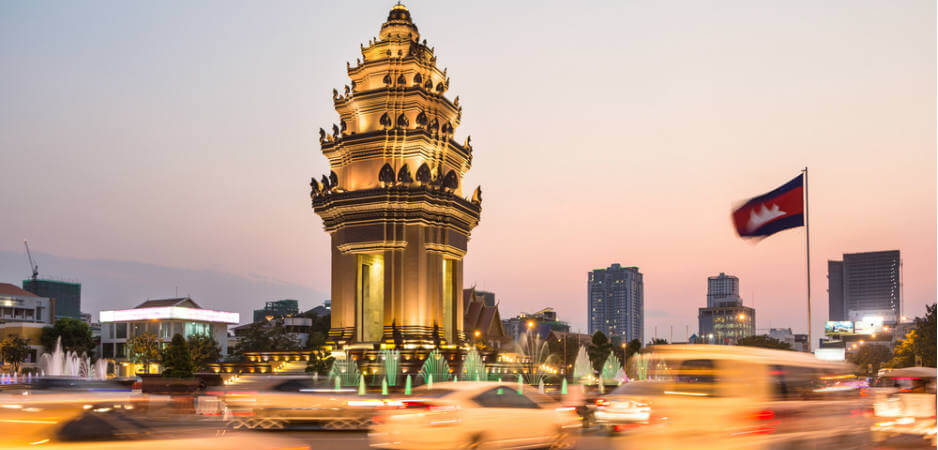What Cambodia’s political crackdown means for ASEAN’s human right credentials.
In what has become a conventional trait among ruling parties in nascent democracies, the Cambodian government dissolved the country’s main opposition party on November 16, 2017, for “plotting a coup.” This was the nadir of a systematically coordinated state-sponsored crackdown on the Cambodia National Rescue Party (CNRP) by the prime minister, Hun Sen, and his ruling Cambodian People’s Party (CPP).
Sen has also orchestrated the closure of independent media outlets and restricted NGO activities, moves analysts have described as attempts to consolidate power in the wake of national elections billed for July 2018. To recall, the CNRP’s leader, Kem Sokha, was arrested for treason in a midnight raid in September 2017, and many of the party’s leadership have since fled into exile.
Expectedly, the dissolution was ordered by the Supreme Court of Cambodia in order to lend some tone of legal validity to the sham process. For someone who has been accused of repression, corruption and political violence in his three-decade rule, Hun’s actions come as no surprise. Needless to say that Dith Munty, the Supreme Court’s president, is one of Hun’s long-term political allies and occupies a seat on the CPP’s highest decision-making body. “It makes a mockery of fair justice to have someone in a leadership position within one political party sit in judgment on the conduct of that party’s main opposition. … There can be no starker example of an inherent conflict of interest,” says Kingsley Abbot, senior international legal advisor for the International Commission of Jurists, a rights group.
To many, this comes as no surprise. The Cambodian government has a notorious history of rights abuses and stifling press freedom. In 2015, it took extensive negotiations by unions and pressure from buyers such as H&M to increase the minimum wage of workers in the garment sector to a paltry $140/month (now set to increase to $170 in 2018), despite the sector being the country’s key export earner; most workers hardly earn decent remuneration for their work. Likewise, 2017 saw a consistent crackdown on the media, the culmination of which 19 radio stations were knocked off-air for “violating contracts” they had with the government. By September, Radio Free Asia had to discontinue its operations in Cambodia when the atmosphere became unbearable.
The opposition leader, Kem Sokha, is still in prison and has faced series of interrogations, despite the fact that he has recently refused to respond to questions, citing the illegality of his detention.
Consequently, the crackdown on the opposition has had a ripple effect both regionally and internationally. The US, which Sen has accused of working with the CNRP to coordinate the alleged coup, has promised “concrete steps” against Cambodia. The EU has also said that “the European Union’s development cooperation and trade preferences are reliant on [Cambodia’s] respect for fundamental human rights and democratic principles,” in a statement by its foreign policy chief, Federica Mogherini.
The Chinese, on the other hand, appear to be backing the Cambodian authorities, with China’s foreign minister, Wang Yi, stating that his government supports Cambodia’s efforts to “protect political stability.” However, nothing appears to be forthcoming from Cambodia’s immediate regional body, Association of Southeast Asian Nations (ASEAN)
ASEAN is an intergovernmental organization of 10 Southeast Asian nations, including Cambodia. Some may argue that ASEAN, a regional bloc with a mandate to promote economic, political, security, military, educational and socio-cultural integration among its members, should not interfere in the crisis. However, a union with a charter built upon principles such as “upholding international law with respect to human rights, social justice and multilateral trade” and “development of friendly external relations and a position with the UN” cannot ignore gross human rights abuses and political repression in its own backyard.
Article 9 of the UN Universal Declaration of Human Rights states that “No one shall be subjected to arbitrary arrest, detention or exile” and article 10 that “Everyone is entitled in full equality to a fair and public hearing by an independent and impartial tribunal in the determination of his rights and obligations and of any criminal charge against him.” Not only has the Cambodian government trampled upon these tenets, but almost the entire declaration is being violated, including the right of citizens to elect their leaders. The moral ground upon which ASEAN stands to claim that it upholds human rights, therefore, comes into question.
Worthy of note is the fact that in November 2012, the ASEAN Human Rights Declaration was unanimously adopted by all members at a meeting in Phnom Penh. The declaration is supposed to assert ASEAN nations’ commitment to human rights protection. Though widely criticized, it was a positive development, but ASEAN must show further commitment.
First, the ASEAN declaration should be revised to reflect a full commitment to protecting human rights. Fundamental freedoms such as the right to freedom of association and the right to be free from enforced disappearance should be included. Also, ambiguous clauses that could be used to undermine human rights, such as “The realization of human rights must be considered in the regional and national context” (Article 7) and that human rights might be limited to preserve national security, public order, public health, public safety, public morality, etc., (Article 8) should be removed. This can be made an incontestable condition for continuous membership of ASEAN by member nations.
While some may suggest that the poor living standards and economy in some ASEAN countries should be given top priority, this will simply amount to misconstruing human processes. Guaranteeing the fundamental human rights of citizens is the very basis of economic prosperity. Therefore, the decision not to prioritize human rights protection will not only keep millions of people under repression but also exacerbate these economic problems.
If there is any good time for ASEAN to take constructive steps in the full protection of human rights and democracy, the recent Cambodian crackdown provides a good platform.
*[Updated: January 22, 2018.]
The views expressed in this article are the author’s own and do not necessarily reflect Fair Observer’s editorial policy.
Photo Credit: AsiaTravel / Shutterstock.com
Support Fair Observer
We rely on your support for our independence, diversity and quality.
For more than 10 years, Fair Observer has been free, fair and independent. No billionaire owns us, no advertisers control us. We are a reader-supported nonprofit. Unlike many other publications, we keep our content free for readers regardless of where they live or whether they can afford to pay. We have no paywalls and no ads.
In the post-truth era of fake news, echo chambers and filter bubbles, we publish a plurality of perspectives from around the world. Anyone can publish with us, but everyone goes through a rigorous editorial process. So, you get fact-checked, well-reasoned content instead of noise.
We publish 2,500+ voices from 90+ countries. We also conduct education and training programs
on subjects ranging from digital media and journalism to writing and critical thinking. This
doesn’t come cheap. Servers, editors, trainers and web developers cost
money.
Please consider supporting us on a regular basis as a recurring donor or a
sustaining member.
Will you support FO’s journalism?
We rely on your support for our independence, diversity and quality.







